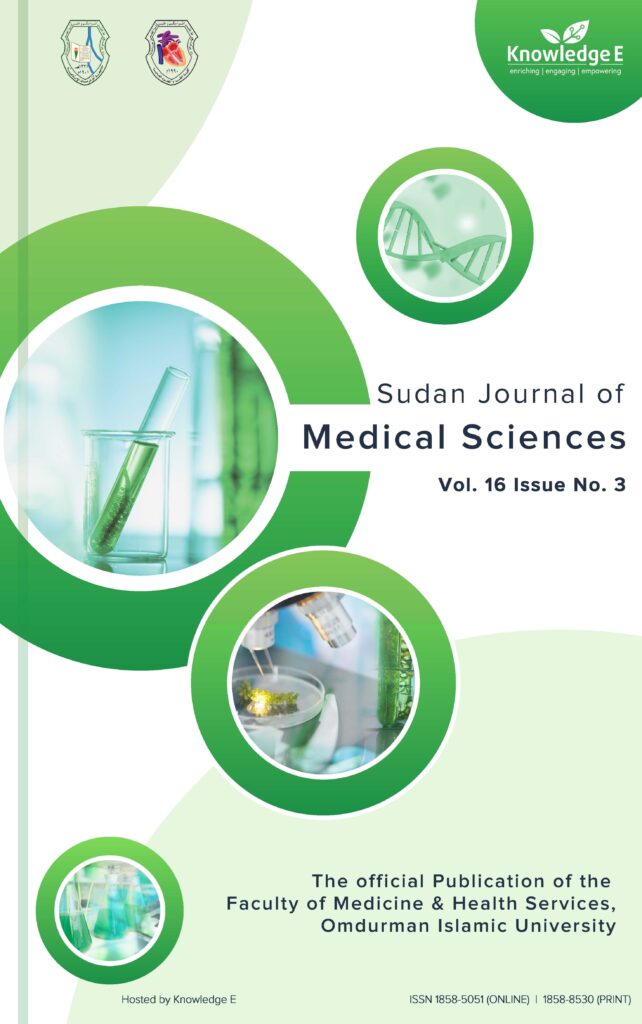
Sudan Journal of Medical Sciences
ISSN: 1858-5051
High-impact research on the latest developments in medicine and healthcare across MENA and Africa
Aetiology of Vertigo as Seen at the Federal Medical Center Lokoja, North Central Nigeria
Published date: May 28 2017
Journal Title: Sudan Journal of Medical Sciences
Issue title: Sudan JMS: Volume 12 (2017), Issue No. 1
Pages: 19-24
Authors:
Abstract:
Background: Human beings are able to maintain their balance from a combination of proprioceptive, graviceptive, visual and the vestibular inputs integrated by the central nervous system. Hence, symptoms of imbalance can arise whenever there is a defect either in these peripheral sensors or the modulating central nervous system. The prevalence of vertigo is 20-30% and it is a major health issue all over the world.
Objectives: To determine the prevalence and causes of vertigo in Federal Medical Center Lokoja, North Central Nigeria.
Materials and Methods: This is a 3-year retrospective hospital based study undertaken in the ENT Unit of the Department of Surgery Federal Medical Centre, Lokoja. From the hospital Medical Records, patients' files were retrieved. Data about their age, sex, occupation, presentation, treatment modality and outcome were extracted, studied and analyzed.
Results: Three thousand two hundred and fourteen patients were seen and 65 of them had vertigo with a prevalence of 2.0%. Fifteen files had incomplete information and were not include in the study. The remaining 50 patients' files that were reviewed, consisted of 32 males (64%) and 18 females (36%). Male to female ratio was 1.8:1 and a mean age of 24.8 years. Bengin Paroxysmal Positional Vertigo (BPPV) 22(44%) was the commonest aetiology found followed by Meniere's disease 8(16%), trauma 7(14%) and Vestibular Neuronitis 5(10%) respectively.
Keywords: Aetiology, vertigo, BPPV, Meniere's disease.
References:
[1] J. P. Pattern, “Balance disorders and Vertigo,” in Scott-Browns Otolaryngology & Head-Neck Surgery, vol. 3, pp. 3932–3933, Hodder Arnold, 3, 7th edition, 2008.
[2] M. Yin, K. Ishikawa, W. H. Wong, and Y. Shibata, “A clinical epidemiological study in 2169 patients with vertigo,” Auris Nasus Larynx, vol. 36, no. 1, pp. 30–35, 2009.
[3] J.-M. Guilemany, P. Martínez, E. Prades, I. Sañudo, R. De España, and A. Cuchi, “Clinical and Epidemiological Study of Vertigo at an Outpatient Clinic,” Acta OtoLaryngologica, vol. 124, no. 1, pp. 49–52, 2004.
[4] N. Chawla and J. S. Olshaker, “Diagnosis and management of dizziness and vertigo,” Medical Clinics of North America, vol. 90, no. 2, pp. 291–304, 2006.
[5] H. K. Neuhauser, “Epidemiology of vertigo,” Current Opinion in Neurology, vol. 20, no. 1, pp. 40–46, 2007.
[6] B. Gopinath, C. M. McMahon, E. Rochtchina, and P. Mitchell, “Dizziness and vertigo in an older population: The Blue Mountains prospective cross-sectional study,” Clinical Otolaryngology, vol. 34, no. 6, pp. 552–556, 2009.
[7] O. A. Sogebi, A. J. Ariba, T. O. Otulana, and B. S. Osalusi, “Vestibular disorders in elderly patients: Characteristics, Causes and consequences,” Pan African Medical Journal, vol. 19, 2014, article no. 146.
[8] O. L. Akeem, “Prevalence, clinical and life-style correlate of dizziness among the community elderly from the ibadan study of ageing,” Ear Nose Throat J, vol. 93, pp. E37–E44, 2014.
[9] W. A. Adegbiji, S. K. Aremu, B. S. Alabi, C. C. Nwawolo, and O. A. Olajuyin, “Vertigo presentation in developing country, Nigeria,” American Journal of Research Communication, vol. 2, no. 5, pp. 258–271, 2014.
[10] S. A. Ogah, “The prevalence of ear wax among the elderly in Lokoja, Nigeria,” International Journal of Academic Research Part A, vol. 6, no. 6, pp. 49–50, 2014.
[11] M. Karatas, “Central vertigo and dizziness: Epidemiology, differential diagnosis, and common causes,” Neurologist, vol. 14, no. 6, pp. 355–364, 2008.
[12] S. Isaradisaikul, N. Navacharoen, C. Hanprasertpong, J. Kangsanarak, and R. Panyathong, “Causes and time-course of vertigo in an ear, nose, and throat clinic,” European Archives of Oto-Rhino-Laryngology, vol. 267, no. 12, pp. 1837–1841, 2010.
[13] I. Shami and A. Al Sanosi, “Causes of Vertigo in Saudi patients seen at tertiary teaching hospital,” Journal of Taibah University Medical Sciences, vol. 6, no. 1, pp. 26–32, 2011.
[14] T. O. Adedeji, J. E. Tobih, and A. O. Olaosun, “Peripheral Vestibular Disorders and Its Management in a Nigerian Teaching Hospital,” World Journal of Medicine and Medical Science, vol. 2, no. 2, pp. 1–11, 2014.
[15] O. G. B. Nwaorgu, P. A. Onakoya, and M. A. Usman, “Cervical vertigo and cervical spondylosis-A need for Adequate Evaluation,” Nig Journal of Medicine, vol. 12, no. 3, pp. 140–144, 2003.